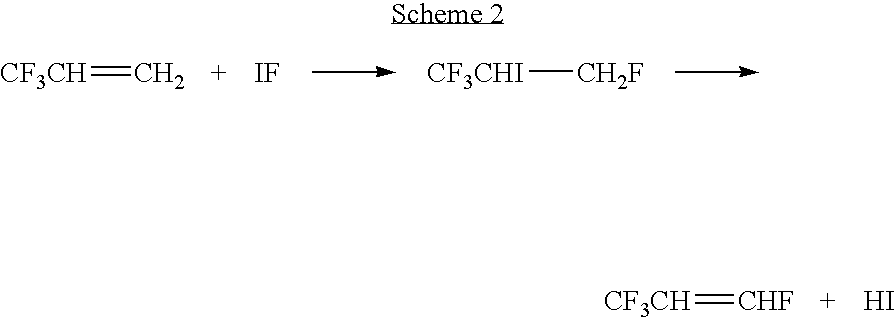Processes for synthesis of tetrafluoropropene
a technology of tetrafluoropropene and process, which is applied in the field of methods for the preparation of tetrafluorinated propene, can solve the problem of not disclosing a process specifically for the preparation of 1,3,3,3-tetrafluoropropen
- Summary
- Abstract
- Description
- Claims
- Application Information
AI Technical Summary
Benefits of technology
Problems solved by technology
Method used
Image
Examples
example 1
Synthesis of CF3CH═CHF from Br2 and HF (BrF) and CF3CH═CH2
[0033]CF3CH═CH2 (0.5 mol ) is reacted with Br2 (0.4 mol) and HF (50 mol) in an teflon lined monel autoclave at about −30° C. to −60° C. in the presence of about 0.005 mol of FeCl3 or SbF5 as the catalyst. The reaction time was approximately 10 to 30 mins at that temperature and then 1 h at room temperature. The reaction products are extracted in CH2Cl2. The major product was CF3CHBrCH2F (55%), the byproduct was mainly CF3CHBrCH2Br (40%). CF3CHBrCH2F was then isolated by distillation which was then dehydrobrominated by passing it over a catalyst bed consisting of about 50 gm of activated carbon at 525° C. with a contact time of about 20 to about 30 seconds to produce a reaction product containing CF3CH═CHF in a yield of from about 95%.
example 2
Synthesis of CF3CH═CHF from IF and CF3CH═CH2
[0034]CF3CH═CH2 is reacted with IF (formed by the reaction of I2 and IF5 or I2 and HF) in appropriate ratios and under conditions effective to produce CF3CHICH2F, which is then dehydroiodinated under conditions effective to produce a reaction product containing CF3CH═CHF, preferably in a yield of from about 95%.
example 3
Synthesis of CF3CH═CHF from CH3CH═CH2 and Cl2
[0035]About 0.5 mol of CH3CH═CH2 is reacted with 0.2 mol of Cl2 at 0° C. in a flow reactor under UV (200–400 nm) light in the presence of 1–3% Au / TiO2 catalyst, and CC14 is used as a solvent. The reaction is conducted at 0 to 10° C. for about 5 to 20 sec to afford CCl3CHClCH2Cl. The product thus formed is then isolated and passed through a flow reactor for a contact time for about 5 to 50 seconds at about 250–400° C. in the presence of 5 molar excess of HF over a 50 g ⅛-inch Cr2O3 catalyst bed to give CF3CHClCH2F. The CF3CHClCH2F was then dehydrochlorinated by passing it over Cr2O3 catalyst (50 g) at 425–550° C. with a contact time of 25 to 30 seconds to afford CF3CH═CFH. The isolated yield of CF3CH═CFH ranged from 40–60%.
PUM
| Property | Measurement | Unit |
|---|---|---|
| temperature | aaaaa | aaaaa |
| temperature | aaaaa | aaaaa |
| temperature | aaaaa | aaaaa |
Abstract
Description
Claims
Application Information
 Login to View More
Login to View More - R&D
- Intellectual Property
- Life Sciences
- Materials
- Tech Scout
- Unparalleled Data Quality
- Higher Quality Content
- 60% Fewer Hallucinations
Browse by: Latest US Patents, China's latest patents, Technical Efficacy Thesaurus, Application Domain, Technology Topic, Popular Technical Reports.
© 2025 PatSnap. All rights reserved.Legal|Privacy policy|Modern Slavery Act Transparency Statement|Sitemap|About US| Contact US: help@patsnap.com


